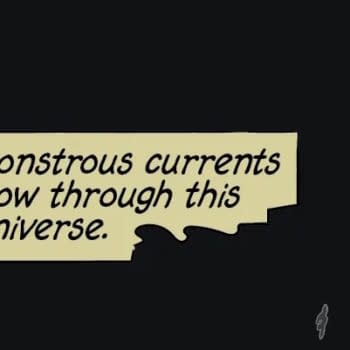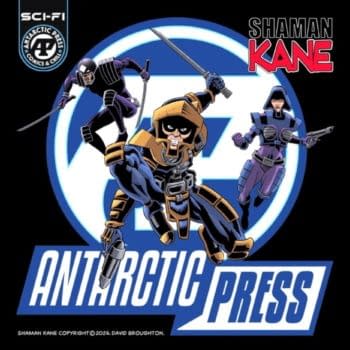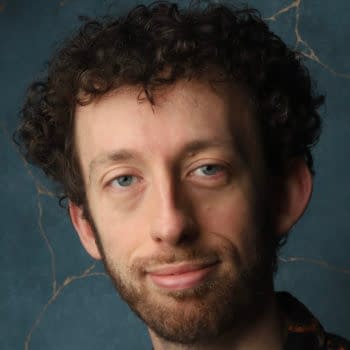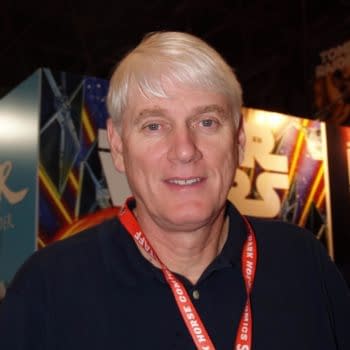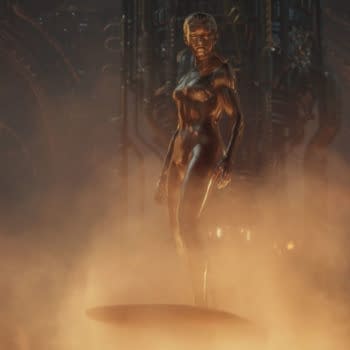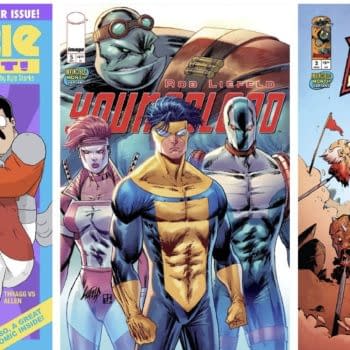Posted in: Comics, Conventions, Phoenix Comicon, Recent Updates | Tagged: Comics, entertainment, phoenix comicon
Life On Mars With Mark Gardner And John J. Rust
From Neil Greenaway (of Nerd Team 30):
I had the chance to sit down and speak with novelists Mark Gardner and John J. Rust at Phoenix Comicon last month. I was eager to hear about the books they had each authored individually, and equally excited to hear that they had recently co-written a sequel to the classic H.G. Wells novel War Of The Worlds. Our conversation ranged from cryptid hunters to space disasters and from superheroes to sea-raptors. Of course we also discussed Martians, and why the humans had to take the fight to Mars.
Bleeding Cool: Let's go ahead and start with Mark. I know that you and John have a novel that you have co-written, but to start, why don't you tell me about some of your earlier books?
Mark Gardner: Well, I mostly write sci-fi, dystopian. I'm a big fan of historical fiction. I recently collaborated on a space disaster with two great authors, Greg Dragon and David Kristoph. They both have successful space opera series. I had read some of their work and I was impressed. With today's technology and instant communication, I emailed them both. I said, "Hey, would you guys want to collaborate on a space disaster with me?" I figured we could do it on my blog.
The catch was that each of us would write a particular perspective. For instance, I write the engineers, Greg writes the bridge crew, and David writes the miners. And so we could all write our own point of view while maintaining a style for that faction. Also, we did not know who the bad guy was. We all assumed that we were responsible for this space disaster. And then in week 18, the fans got to vote on who the villain was.
The fun part of that was whichever two teams turned out not to be the villains now had to resolve all the red herrings. It's interesting when you don't know how the story is going to end, because it forces you to stay on your toes. You don't want the other guys to have to pick up your slack.
BC: Now when you describe this, did this all play out in a written format or was this a podcast?
MG: This all took place on my blog, article94.com. And every week we would write a new chapter. We would go in the order of David first, then Greg, then myself. And we never knew what was going to happen. We had a vague outline, obviously, but whatever happened in the chapter was up to that author.
It was a lot of fun because we have very different styles, but the styles meshed because they were consistent to a viewpoint. We will be releasing this as a novel called Days Until Home. It should be out this fall. I actually brought a bunch of early copies to con to sell to fans. This early edition is just an unedited blog compilation; the edited version is what will be released in the fall.
BC: Who will that be putting that out for you?
MG: I'm actually going to self-publish this one. A lot of publishers don't know how to deal with multi-author books, unless all of the authors are really big names. We just decided it would be easier to self-publish it. The blog itself was a super mega hit, and so we are also expecting the novel to be a super mega hit. (laughs)
BC: When you say you were looking to self-publish it, does that mean crowdfunding?
MG: We might do a little bit of crowdfunding for the hardcover. We are going to need an ISBN. But it would be a small amount of money; really, a couple hundred bucks is all we would need for that. It is written and we have paid for all the editing out of our pockets, so it is done.
BC: I understand you also have some superhero novels. What can you tell me about those?
MG: I do have a superhero novel. It's called Sixteen Sunsets. I have a funny behind-the-scenes story on that one. When I finished writing it two years ago, I was short on my word count. Well, I have a great friend over in Bulgaria named Cindy Vaskova. I called her up and told her I was short on my word count but I was burned out, and I asked if she could give me a subplot. So Cindy, in like a week, breaks out a 10,000 word subplot.
I got her draft, read it, and it blew me away. I loved the character. So when it came time to write a sequel, I asked her if she would like to co-write it with me. We just finished that sequel about a month ago. We came up 25,000 words over our projection. Joel Cotejar did the art for the first book and he is back for the second one. He is a former Valiant Comics artist.
BC: Can you give me a brief synopsis of the story in that series?
MG: Sure. Sixteen Sunsets is about a guy, just a regular guy, who gets a diagnosis of cancer. And this is semi-autobiographical because I have leukemia, and this allowed me to put some of my thoughts and feelings on that into the novel. Anyway, after my character gets this diagnosis, he also finds out he has superpowers. He finds out other people have superpowers. And superheroes have been around for much longer than people thought. Every time something strange has happened, it was probably because of some super-powered person. So it is the story of him coming to accept that he has superpowers, and cancer at the same time.
It shows how having these god-like powers can really change the way someone thinks. I have my bachelor's degree in applied human behavior from Northern Arizona University, so I used my training from that to make the behavior of my characters as real as possible.
Now in the sequel, Moonrise, we have kicked up the superheroes a notch. We have a character who wants to create a super-powered army, to basically wipe out all humans. They see the humans as defective because they don't have superpowers. Of course, there are returning characters, as well, from book one. Then in 2018, we will probably start writing the third volume, which will be called Starfall.
BC: If you already have a third novel planned, do you have an endpoint for this universe? Do you know how the story ends?
MG: Each novel really is self-contained. I am not a big fan of the cliffhanger ending, or of the gratuitous cliffhanger ending. If you can end your story, but then say, "Oh, look what was happening over here," that to me is an acceptable cliffhanger ending. So each of my stories can be read by itself, but of course it's more enjoyable as part of an overarching sequence.
BC: You have said that this is a superhero story, and you are even working with a comic artist. Have you considered turning this story into a graphic novel?
MG: I have done some research on that. And as I'm sure you know, writing a graphic novel is extremely different from writing a novel. If I found the right team to do it, because I would need an editor who knows how the graphic format works. Then you need to consolidate a 300-page novel into a 40-page graphic novel or a series of floppies. If I ever did it, I would want the Fillbach Brothers for the sequential art.
BC: I think that brings us to your War of the Worlds sequel, War of the Worlds: Retaliation. How did that come about?
MG: My co-author for that one, John J. Rust, is a big fan fiction writer. He has, I think, over two million words written [of] Harry Potter fan fiction. One of the other pieces of fan fiction he had was a sequel to War of the Worlds. It was probably novella-length. I read it and thought that it would make a really great novel, and the worldwide copyright on War of the Worlds was expiring. We did a little research and found out that the copyright did indeed expire on December 31st, 2016. So we teamed up and rewrote his fan fiction into a novel. We are both big Harry Turtledove fans, so we strove for realism and accuracy.
The premise is that when the Martians died in 1898, they left all their stuff behind. Tripods, communicators, everything. And the humans are a wily bunch, so they reverse-engineer all that stuff. Now that we have the technology, we don't want to be attacked again. So we take the fight to Mars. The fight will feature Patton, Rommel, all these historic figures. It will be a classic alien invasion, except the humans are the aliens.
BC: Interesting. How did you and John come to collaborate on this?
MG: We actually work together in radio broadcasting, and we're both authors, and friends. So it came about that way. We pitched it to a few publishers, and we actually found out there was another author working on a different sequel [to] War of the Worlds. But it has been great, and we were able to sell our story to Severed Press, out of Tasmania.
BC: All right, I think with that we can ask your partner, John J. Rust, to step in and answer some questions. We can start with John where we left off with Mark, with War of the Worlds: Retaliation. Can you tell us how you came to be a part of this collaboration?
John J. Rust: As Mark said, this started as a fan fiction piece. One day I just got to thinking about War of the Worlds. I was thinking about when the Martians died, their tripods were left behind, mostly intact. A few tripods we're taking out by the British army, but most of them would have been fine. The ships that brought them to Earth were still intact. If all this stuff was left lying around, still intact, I think it makes sense that humans would try to figure it out.
In my story, the humans are able to successfully reverse engineer the tech. And by 1924, humans have spaceships, tripods, jet fighters. I figured a 25-year gap would be enough for them to have reverse-engineered some of this stuff and also done an element of rebuilding in the cities.
BC: What makes you think that humanity would go after Mars?
JJR: Considering how devastating the invasion was — mind you, we only see it from the British perspective, but this was happening all over the world — millions must have died, cities must lie in ruin. I think that humanity would be so terrified of this happening again that their focus would be on going to Mars and stopping the Martians once and for all. We need to ensure that this tragedy never happens again. And of course, the attack changed history. Because this happened, there will be no first World War. Earth joins in an alliance to defeat Mars.
BC: With this role reversal, where the humans become the invaders, do we get a taste at all for Martian home life?
JJR: That is of course one of the things that we never see in the H.G. Wells novel, because everything is told from the point-of-view of the nameless narrator. And the answer is yes, we do. I wanted to see what would the Martians be thinking, what would their reaction be to their Cleansing Force having been killed off by bacteria?
Without giving too much away, in our novel the Martians are now afraid of humanity. We pose a threat, and not even through a weapon. Just by breathing, we pose a threat to them. So we find that in this 25-year gap, the Martians have become almost an isolationist race. They want nothing to do with Earth. They have a military leader (called the Supreme Guardian) who sees the threat that Earth poses, but his leaders won't listen to him.
BC: Proving that politics is universal. I think that about covers War of the Worlds: Retaliation for us. What can you tell me about your other novels?
JJR: A lot of what I do is sci-fi or action adventure. Mark had mentioned Severed Press, they also published my novel Sea Raptor.
BC: Sea Raptor? What is that one about?
JJR: That one is about a group of Cryptid Hunters. The main characters are an ex-Army Ranger named Jack and a wildlife photographer named Karen. Jack has been out of the army for over a year, and this is a guy whose whole life was about becoming an Army Ranger. He achieves that goal, but during his service something happens (I won't tell you what) and the Army has to let him go. So he gets hooked up with a group of Cryptid Hunters and they start investigating a new sea creature that has been killing people up and down the Jersey Shore. That investigation leads to the team learning about a whole new conspiracy. And we actually have a sequel to that one, called Reptilian, coming out in maybe another month or so.
BC: As we get close to wrapping up, do you think you and Mark would collaborate again? Do you have more to say in the Martian saga?
JJR: It is funny that you mention that, because probably in the next month or so we are going to be beginning a sequel to Retaliation. It is tentatively titled War of the Worlds: Firestorm. And that should pick up about 20 years after the events in Retaliation.
BC: As a final question, if people wanted to see more of your work, or find out more about your books, where would they look online?
MG: The best place to find out about everything Mark Gardner is article94.com. And my Twitter handle is article_94.
JJR: My Amazon page on amazon.com, and you can find me on Facebook as John J. Rust, author. I am also on Twitter @JohnJRust.













